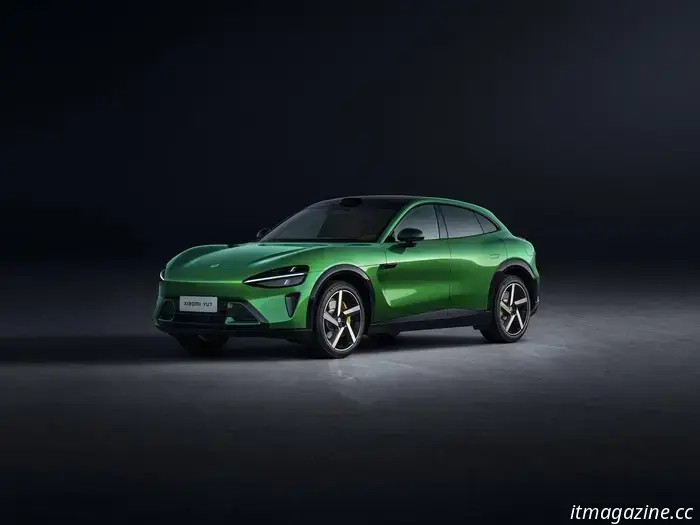
Xiaomi makes history with 289,000 reservations in just one hour for its second electric vehicle, competing with the Tesla Model Y.
The Xiaomi YU7 is a mid-to-large SUV with dimensions of 4,999 mm (L) × 1,996 mm (W) × 1,600 mm (H) and a wheelbase of 3,000 mm.
China's electric vehicle market, which has been particularly active, saw a significant event on Thursday with the launch of Xiaomi's YU7 crossover, considered by many to pose a substantial threat to the long-standing global dominance of the Tesla Model Y. The consumer electronics company shattered records by attracting over 289,000 reservations in just one hour after its launch, with RMB 5,000 ($698) refundable deposits. This performance was described by CEO Lei Jun as “far more than expected” and potentially a “miracle” within the Chinese automotive sector.
Analysts from Citic Securities remarked on Friday that they believe the Xiaomi YU7 is priced very competitively and has the potential to become the best-selling EV model in the entire market. They noted that the YU7 is priced slightly lower than the Tesla Model Y while delivering superior performance. Similarly, Jefferies analysts expressed their expectation that the YU7 could capture market share from the Model Y.
The entry-level YU7 starts at RMB 253,500 ($35,364), which is exactly RMB 10,000 less than the Tesla Model Y in China. Xiaomi's second model, and its first SUV, appears poised to meet expectations with better-balanced performance compared to many competitors.
The base YU7 offers an impressive driving range of 835 kilometers (519 miles), powered by a significant iron-based battery pack from CATL, with a capacity of 96.3 kilowatt-hours (kWh). This battery can charge from 10% to 80% in just 21 minutes. In comparison, the rear-wheel-drive Model Y has an official range of 593 km, while the long-range model provides 719 km.
As for the top-tier YU7 Max, the combined output of Xiaomi's HyperEngine V6s electric motors exceeds 690 PS (681 hp), enabling it to accelerate to 100 km/h (62 mph) in just three seconds, excluding the initial foot of travel. Lei stated that such performance is “almost unavailable” in vehicles priced below RMB 1 million.
The YU7 variants also come equipped with Xiaomi’s “End-to-end Assisted Driving” system, featuring a lidar unit powered by NVIDIA’s advanced four-nanometer Thor processor, and the car's infotainment system integrates Qualcomm’s Snapdragon 8 gen 3 smartphone processor. Lei mentioned that the company is considering deploying the second generation of its own developed chip, the Xuanjie O1, in future models.
Xiaomi highlighted the five-seater crossover's comfort, providing more headroom and legroom across both rows compared to Tesla’s Model Y, along with Nappa leather seats, a luxurious option in many high-end vehicle interiors. The car's glass sunroof utilizes electrochromic (EC) technology, which absorbs solar energy more efficiently than the window blinds provided by Tesla, thereby ensuring a cooler cabin, as mentioned by Lei.
In context, Xiaomi received 88,898 pre-orders in the 24 hours following the launch of its first consumer vehicle last March and has delivered approximately 258,000 SU7 sedans within 13 months as of May 21. The company aims to sell 350,000 cars this year, despite facing production challenges, and is planning to expand its manufacturing facility in Beijing amid overcapacity issues affecting various competitors.
Several Chinese automakers have aimed to position their all-electric SUVs against the Tesla Model Y, the best-selling vehicle globally from 2023 to 2024. However, their attempts, including models like the Luxeed R7 and NIO’s Onvo L60, have struggled to rival the Model Y's success in China. The US automaker sold 201,926 vehicles in China during the first five months of this year, according to data compiled by the China Passenger Car Association.
Jill Shen is a technology reporter based in Shanghai, covering Chinese mobility, autonomous vehicles, and electric cars. You can connect with her via e-mail or on Twitter.


Xiaomi makes history with 289,000 reservations in just one hour for its second electric vehicle, competing with the Tesla Model Y.
Analysts at Citic Securities informed clients that they consider the Xiaomi YU7 to be very attractively priced and potentially the top-selling EV model in the overall market.

